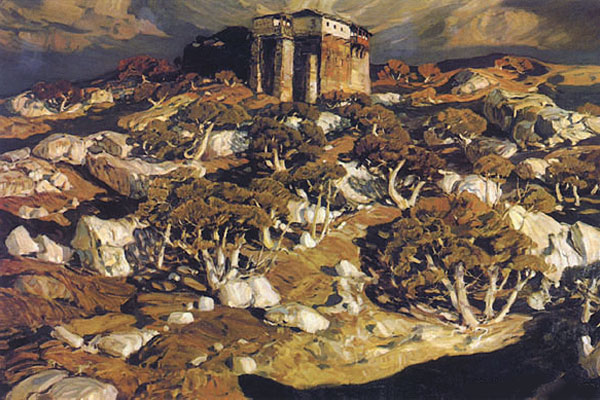|
Ozbek Han Mosque
The Ozbek Han Mosque ( crh, Озбек Хан джамиси, Özbek Han camisi; tr, Özbek Han Camii) is a mosque in Stary Krym, Crimea. The Ozbek Han Mosque is the oldest mosque in Crimea, built during the reign of Özbeg Khan in 1314. History Until the 14th century Staryi Krym was known as Solkhat, a prospering city during the reign of the Golden Horde. Early Crimean Khans had their capital in Solkhat until the first part of the 16th century, when the capital was moved to Bakhchisaray, and Solkhat gradually lost its importance as a cultural and economic center. The Ozbek Han Mosque was built in 1314 and the madrasah, adjacent to the southern wall of the mosque, was built by Inci Hatun, daughter of Kilburun Bey, in 1332. Of the madrasah only ruins remain today. The mosque has a square floor plan, which reveals architectural features similar to those found in Anatolia during the Seljuk period. A unique feature of the mosque is its monumental entrance with a carved wooden door ... [...More Info...] [...Related Items...] OR: [Wikipedia] [Google] [Baidu] |
Staryi Krym
Staryi Krym (russian: Старый Крым; uk, Старий Крим; crh, Eski Qırım, italic=yes; in all three languages) is a small historical town and former bishopric in Kirovske Raion of Crimea, Ukraine. It has been illegally occupied by Russia since 2014 (see Annexation of Crimea by the Russian Federation). It is located in the Eastern Crimean Peninsula, approximately 25 km (15 mi.) west of Theodosia. Population: Names During the late 13th century, the town was known as either ''Solkhat'' (''Solkhad'', ''Solghad'', ) or as ''Qrım'' ( ). Neither name is attested prior to the 13th century, but on the authority of al-Qalqashandi, ''Solkhat'' is the older of the two, dating to the period prior to the Mongol conquest in mid-1238. Both names coexisted during the 14th century, but the name ''Qırım'' came to displace ''Solkhat'' by the early 15th. The origin of either name is uncertain. Some consider ''Solkhat'' to be related to the Greek ''Colchis''. ... [...More Info...] [...Related Items...] OR: [Wikipedia] [Google] [Baidu] |
Madrasa
Madrasa (, also , ; Arabic: مدرسة , pl. , ) is the Arabic word for any type of educational institution, secular or religious (of any religion), whether for elementary instruction or higher learning. The word is variously transliterated ''Madrasah arifah'', ''medresa'', ''madrassa'', ''madraza'', ''medrese'', etc. In countries outside the Arab world, the word usually refers to a specific type of religious school or college for the study of the religion of Islam, though this may not be the only subject studied. In an architectural and historical context, the term generally refers to a particular kind of institution in the historic Muslim world which primarily taught Islamic law and jurisprudence (''fiqh''), as well as other subjects on occasion. The origin of this type of institution is widely credited to Nizam al-Mulk, a vizier under the Seljuks in the 11th century, who was responsible for building the first network of official madrasas in Iran, Mesopotamia, and Khorasan. ... [...More Info...] [...Related Items...] OR: [Wikipedia] [Google] [Baidu] |
Religious Buildings And Structures Completed In 1314
Religion is usually defined as a social-cultural system of designated behaviors and practices, morals, beliefs, worldviews, texts, sanctified places, prophecies, ethics, or organizations, that generally relates humanity to supernatural, transcendental, and spiritual elements; however, there is no scholarly consensus over what precisely constitutes a religion. Different religions may or may not contain various elements ranging from the divine, sacred things, faith,Tillich, P. (1957) ''Dynamics of faith''. Harper Perennial; (p. 1). a supernatural being or supernatural beings or "some sort of ultimacy and transcendence that will provide norms and power for the rest of life". Religious practices may include rituals, sermons, commemoration or veneration (of deities or saints), sacrifices, festivals, feasts, trances, initiations, funerary services, matrimonial services, meditation, prayer, music, art, dance, public service, or other aspects of human culture. Religions have sa ... [...More Info...] [...Related Items...] OR: [Wikipedia] [Google] [Baidu] |


